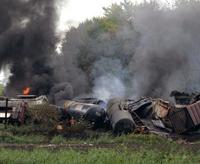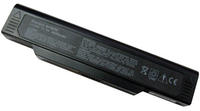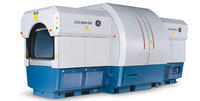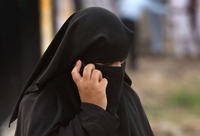-
Railroads do not let HAZMAT teams know what is on train

Lethal chemicals roll through the backyards of cities and towns without the knowledge of these towns; residents; railroads do not share information about the schedule and contents of HAZMAT cargo with these towns’ emergency services, so the services cannot prepare for catastrophe; if chlorine or ammonia were to escape from a punctured tanker — in an accident or derailment — it would form a toxic cloud; a compromised 90-ton rail car of chlorine could create a plume fifteen miles long by five miles wide; the U.S. railroad industry transported some 75,000 tank cars of toxic inhalants nationwide in 2009
-
-
Rescue 21 bolsters Coast Guard's search-and-rescue capablilities
Rescue 21 is already covering portions of the U.S. coastline and, as of last week, officially includes the coasts of Maryland, Virginia, Washington, D.C., and the upper Chesapeake Bay
-
-
New airline safety worry: lithium-ion batteries

In January, the U.S. Department of Transportation (DOT) proposed stricter rules for companies that ship lithium batteries in cargo holds; lithium-battery experts, security analysts, and flight attendants wonder whether stricter rules are also needed in airline passenger cabins to prevent fires or worse: a possible attempt by a terrorist to bring down a plane by rigging a large number of batteries together to start a fire; right now, there is no limit to how many small lithium-ion batteries a passenger can carry aboard a flight; a materials scientist at the Argonne National Laboratory says that even a single cellphone battery could start a fire: “A smart terrorist can start fires with these things…. Any energy-storage device packs a lot of energy in a small space and can be used for good or evil”
-
-
The last romantic: student who breached airport security to kiss girlfriend fined $3,000
A Rutgers University graduate student who breached Newark Airport’s security to kiss his girlfriend is fined $3,000 by TSA; the breach, committed after a guard left his post, shut down Terminal C for six hours, stranded 16,000 passengers, delayed 100 flights, and canceled 27 others
-
-
3D, interactive X-ray to offer dramatic improvement in security scans
The latest X-ray scanners can glean information about the atomic or molecular weight of a substance, and so help distinguish between materials, but the results are crude; the best they can manage is to show metal objects in one color, organic materials in another, and everything else in a third color; a new technique — called kinetic depth effect X-ray imaging, or KDEX — builds up a 3D image of the object which can be rotated and viewed from a wide range of angles
-
-
New baggage screening system from Morpho Detection evaluated

Unlike most baggage-screening systems that create two-dimensional images of objects inside luggage, the CTX 9800 DSi scanners from Morpho Detection create three-dimensional images that can be digitally manipulated by personnel when a bag is deemed to be suspicious; the machines also use advanced software to detect suspicious items; Mineta San Jose International Airport once used 28 machines to process 1,800 bags an hour, but the new system will be able to process the same number of bags using eight machines and require fewer employees to supervise the process; the technology reduces reliance on human observation and interaction with the bags; for the majority of bags, employee contact is only required when a piece of luggage is placed on or taken off the conveyor belt
-
-
100 percent air-cargo screening is going smoothly -- so far
On 1 August a law mandating 100 percent screening of cargo transported on passenger aircraft took effect; the shipping industry says that, so far, are off to a good start; experts point out that August is relatively slow shipping month, and that the real test will come in mid-September, when the busy air cargo shipping season begins
-
-
India equipped to protect the October Commonwealth Games against WMD attacks
India will have a big security challenge when the Commonwealth Games begin in October; Indian security agencies say they are equipped to face chemical, biological, radiological, and nuclear (CBRN) terrorist threats during the games; intelligence agencies have been working on the possibility of attacks from Kashmiri groups like the Hizbul Mujahidden, the Pakistan-based Lashkar-e-Taiba (LeT), the Taliban from Pakistan or Afghanistan, and even Al Qaeda; militant outfits of various other ideological hues are also on the police radar
-
-
Tire tags reveal driver whereabouts
As computerized systems are being increasingly used in automobiles, critics are asking what safeguards system makers are putting in place to prevent vulnerabilities in such systems, knowing that bugs and security holes invariably sneak into all software
-
-
BioStorage approved for cargo pre-screens
Shipments of pharmaceutical and biotech materials typically include temperature- and time-sensitive materials — but under the Implementing Recommendations of the 9/11 Commission Act, which took effect 1 August, all cargo transported on passenger aircraft is required to be screened at the piece level, prior to being transported; TSA approves Indiana-based BioStorage Technologies to pre-screen its shipments to avoid airport delays
-
-
TSA denies Unisys' ITIP contract bid, reaffirms selection of CSC
Unisys filed a protest with the Government Accountability Office (GAO) over the awarding the TSA’s Information Technology Infrastructure Program (ITIP) contract to Computer Sciences Corp. (CSC); the ITIP award has been worth over $1 billion to Unisys and going forward was valued at $500 million over five years to run TSA’s information technology infrastructure; the 2-year long battle is now over, with TSA denying Unisys’s bid and saying CSC will restart the contract 1 September
-
-
Donna Shalala detained and interrogated for hours at Israeli airport
Donna Shalala, president of the University of Miami and secretary of health and human services in the Clinton administration, is detained for two-and-a-half hours by Israeli security personnel at Tel Aviv airport, “during which she was asked invasive and humiliating personal questions,” according to an Israeli daily newspaper; Shalala, 69, is of Lebanese decent
-
-
Canadians outraged: Veiled Muslim women not required to lift veil, prove ID at airports

Canadian airport security personnel do not ask veiled Muslims women to lift their veils, show and ID, and prove their identity; the veiled women do not even interact with security personnel: rather, a man traveling with the women typically hands in all the passports and is the only one to communicate with airline staff while the veiled women simply walk through, unchecked and unidentified; a video showing two veiled women walking unchecked through security at Montreal’s Trudeau International Airport causes outrage in Canada
-
-
TSA enlisting parking attendants and meter maids in anti-terror campaign
From the 1993 attempt on the Twin towers, to Timothy McVeigh, to Faisal Shahzad, the United States has experience with terrorists using vehicles to carry out their plots; TSA’s First Observer program will roll out lesson plans for workers such as parking attendants and meter maids to help them become the latest anti-terror weapons
-
-
New explosives detection technologies show promise
An adversary who is willing to die trying to carry out a mission is one of the reasons why more conventional security organizations find it so difficult to pursue their protection mission effectively in an asymmetrical war — the kind of war terrorists engage in; new explosive detection technologies may be of help
-
More headlines
The long view
New Technology is Keeping the Skies Safe
DHS S&T Baggage, Cargo, and People Screening (BCP) Program develops state-of-the-art screening solutions to help secure airspace, communities, and borders
